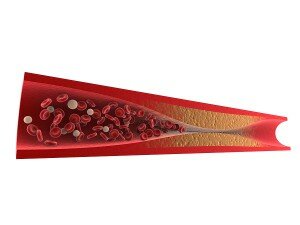 Diabetes has grown to epidemic proportions and so have the cardiovascular complications of diabetes. According to the most recent statistics (2011) from the Centers for Disease Control and Prevention (CDC), nearly 26 million Americans have diabetes. However, what makes this “America’s largest healthcare epidemic” is that 79 million Americans are in a pre-diabetic condition, where their blood glucose levels are higher than normal but not high enough to be diagnosed with type 2 diabetes.
Diabetes has grown to epidemic proportions and so have the cardiovascular complications of diabetes. According to the most recent statistics (2011) from the Centers for Disease Control and Prevention (CDC), nearly 26 million Americans have diabetes. However, what makes this “America’s largest healthcare epidemic” is that 79 million Americans are in a pre-diabetic condition, where their blood glucose levels are higher than normal but not high enough to be diagnosed with type 2 diabetes.
This means that 35% of the American population is either in a pre-diabetic or diabetic condition and this is creating an enormous health challenge. Even just being pre-diabetic raises a person’s risk for heart disease and stroke. High blood sugar causes oxidative stress or damage to your endothelium resulting in the following cardiovascular complications of diabetes:
- Poor Circulation Leading to Lower-Limb Numbness and Amputations
- Poor Kidney Function
- Cardiovascular Disease
- High Blood Pressure
- Increased Potential for Strokes and Heart Attacks
Two Most Devastating Cardiovascular Complications of Diabetes!
While the cardiovascular complications of diabetes are staggering, there are two that pose the greatest risk to a person’s health and longevity. Statistics can change over time but these two have been pretty consistent. They are:
- 66% of Diabetics Have High Blood Pressure!
- 66% of Diabetics Die From a Heart Attack or Stroke!
Two-thirds of all diabetics are confronted with this daily reality. It is why Dr. J. Joseph Prendergast, a noted clinical expert in this area, made the following statement:
“Many people still think diabetes is a disease about sugar. It’s not the sugar! It’s the complications!”
Dr. Prendergast is not discounting the need to control your blood sugar. That’s critically important. What he’s trying to get people and the medical profession to understand is that unregulated glucose (blood sugar) causes high levels of oxidative stress, which directly damages the endothelium and its ability to properly produce nitric oxide – the master signaling molecule of your entire cardiovascular system. To prevent the cardiovascular complications of diabetes you must repair this damage, and any future damage, to the endothelium.
How to Address Cardiovascular Complications of Diabetes!
To address the cardiovascular complications of diabetes you must put in place a program to repair and properly nourish your endothelium. This program is in addition to learning how to control your blood sugar levels. Both are equally important. Unfortunately little is done in the area of endothelial cell health.
Why? Because most people have never heard of the endothelium and most physicians do not understand how to treat it. Briefly, your endothelium lines all of your cardiovascular system. It is only one-cell thick yet it regulates many of the functions of the cardiovascular system.
This area is so important that the 1998 Nobel Prize in Medicine was awarded to three American researchers who discovered how your endothelium converts the amino acid L-arginine into nitric oxide – the master signaling molecule of your entire cardiovascular system.
How Nitric Oxide Impacts Cardiovascular Complications of Diabetes!
Nitric oxide impacts cardiovascular complications of diabetes in two extremely specific ways. First, nitric oxide regulates the muscle tone of blood vessels to have a major impact on controlling blood pressure. In fact, nitric oxide is your body’s most powerful vasodilator. It causes the smooth muscle of your vascular wall to relax. This helps to reduce blood pressure by improving blood flow through the vascular system.
Since 66 percent of all diabetics have high blood pressure, by improving their ability to properly produce nitric oxide you can aid them in better regulating their blood pressure. Because high blood pressure is the major cause of a stroke you will also help them to substantially reduce this risk.
Second, nitric oxide keeps blood platelet cells from grouping together to form a clot. This helps to prevent heart attacks and strokes. According to Nobel Laureate in Medicine Dr. Louis J. Ignarro, nitric oxide:
“. . . is produced by the body specifically to help keeps arteries and veins free of the plaque that causes stroke and to maintain normal blood pressure by relaxing the arteries, thereby regulating the rate of blood flow and preventing coronaries. Nitric oxide is the body’s natural cardiovascular wonder drug.”
This means that you can use proven and natural methods to address these two specific issues of cardiovascular complications of diabetes. Proper supplementation with therapeutic levels of the amino acids L-arginine and L-citrulline can have a profound effect on repairing and properly nourishing your endothelium for therapeutic increases in nitric oxide production. This would help millions of diabetics to reduce their risks for these cardiovascular complications of diabetes.
Additional Resources to Help You Understand How to Address the Cardiovascular Complications of Diabetes!
To help you better understand how the endothelium impacts your cardiovascular health, please click here.
To help you better understand how the endothelium controls blood pressure, please click here.
To help you better understand how nourishing and repairing your endothelium will improve its ability to properly improve nitric oxide, and how this directly impacts many of the cardiovascular complications of diabetes, please click here.
By directly putting into place a plan of action that will improve endothelial cell health and function, especially in the area of improved nitric oxide production, you can substantially reduce the risk for the two major cardiovascular complications of diabetes. If you found this information helpful then please share this on Facebook and Twitter.
Together we can work to save a million lives by helping to educate others about endothelial cell health and how therapeutic levels of nitric oxide can directly address the two greatest cardiovascular complications of diabetes.
Dan Hammer
Dan Hammer has a background in biology, chemistry, and exercise physiology. He used to run one of the largest health club operations in the Chicagoland area and has been helping people with their wellness issues for more than 25 years.
The information contained in this article is for general information purposes only and never as a substitute for professional medical advice or medical exam. The information about cardiovascular complications of diabetes has not been evaluated by the Food and Drug Administration and should not be used to diagnose, treat, cure or prevent any disease without the supervision of a qualified medical doctor.

 As we learned in the previous article Complications of Diabetes – Part 1 there is a one-celled thick organ called the Endothelium that is constantly being damaged by high blood sugar levels. This damage to the endothelial cells reduces their ability to proper produce Nitric Oxide the master signaling molecule of your entire cardiovascular system.
As we learned in the previous article Complications of Diabetes – Part 1 there is a one-celled thick organ called the Endothelium that is constantly being damaged by high blood sugar levels. This damage to the endothelial cells reduces their ability to proper produce Nitric Oxide the master signaling molecule of your entire cardiovascular system.
